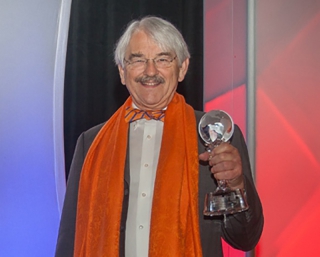
Striving for Excellence
29 November 2018Dr. Fred Mayo discusses helping students establish and attain goals of excellence.
By Dr. Fred Mayo, CHE, CHT
This fall we discussed ways to build your classroom culture which involved setting a tone about learning and professionalism; promoting cooperation and teamwork; focusing on excellence; and committing to quality ingredients, food safety and security. Last month, we discussed promoting cooperation and teamwork. This month is about striving for excellence which is a commitment to quality in all things from ingredients to food safety.
Why Excellence?
In the culinary arts, we strive for excellence in preparing, presenting and serving food. It begins with excellent utensils and fresh ingredients combined with outstanding knowledge of cooking principles and practices. Who wants to serve mediocre food to patrons? What a way to think about cooking and feeding people in any restaurant or food service operation! We also strive for excellence in keeping food safe.
If we don’t make good looking, good smelling, and good tasting food, why are we in this business? It is not an easy industry but for those that love it, it is the only one that makes sense and the best one for discipline, teamwork, creativity, growth and excitement. Therefore, helping our students focus on excellence in all that they do should be one of our most consistent and important goals in teaching culinary arts, regardless of the specific topic.
The Standard
Sometimes, the focus on improving and attaining excellence causes individuals to compete with others when we should be encouraging them to complete with themselves. In a professional competion, the judges compare the products with a high standard using public criteria but they also compare the products of one team with the products of another team. In that way, culinary students are always being compared with their peers. We need to spend energy encouraging them to establish their own goals and compete with their own level of cooking skills if we want them to reach their personal best. After all, their personal standard will be the one they learn to use in the industry; helping them with that standard now is a way to help them prepare for graduation and working full-time.
Encouraging Students to Strive
There are many strategies to use in motivating our students. We can establish high expectations, demonstrate their ability to attain them, and show them our dedication to help them reach those goals. We can serve as role models in all that we do – being positive, pushing ourselves to do our best and showing our commitment to improve in cooking, baking, pastry, serving or teaching.
Some of the more common strategies to help students achieve excellence include encouraging them to obtain feedback from their fellow students as opposed to feedback from their teachers. That means suggesting the practice of soliciting feedback and helping them learn to ask specific questions of their team mates and other students in the class so that they learn what they need to know to make improvements. A second strategy involves educating them to ask specific questions from us as their teachers. Try asking the students what they want feedback about instead of our providing feedback based on what we notice and want to comment on. It might include station set up, use of equipment, teamwork, presentation, taste and many other topics. However, it is their task to ask for specific feedback. That does not mean that we should refrain from using our professional judgment and correcting them while working. It may mean shifting the focus during a critique session and waiting for them to provide feedback.
Perhaps the most important way to encourage our students to strive for excellence is to discuss the topic often and draw attention to the difference between adequate and excellence whenever you have a chance. Another way is to post these quotes in the classroom or use them on PowerPoint slides.
- “The noblest search is the search for excellence.”
Lyndon B. Johnson, former President of the United States - “Excellence is the gradual result of always striving to do better.”
Pat Riley, NBA player and coach - “Excellence is not a skill. It is an attitude.”
Ralph Marston, football player - “Excellence is not being the best; it is doing your best.”
Anonymous
Summary
Hopefully, this Mayo Clinic encourages you to focus on helping your students establish goals of excellence and assist them in attaining those goals. It is a hard time of the semester or quarter to focus on excellence, but it may be the best time so that our students do not get focused on adequacy and miss the chance to do something really special.
Next month, we will begin a new focus and discuss teaching customer service, an important aspect of our industry. We will analyze the components of customer service, aspects of building loyalty among customers and service strategies. If you have suggestions for other topics or teaching practices you want to share, send them to me at This email address is being protected from spambots. You need JavaScript enabled to view it. and I will include them in future Mayo Clinics.
Dr. Fred Mayo, CHE, CHT, is retired as a clinical professor of hotel and tourism management at New York University. As principal of Mayo Consulting Services, he continues to teach around the globe and is a regular presenter at CAFÉ events nationwide.
